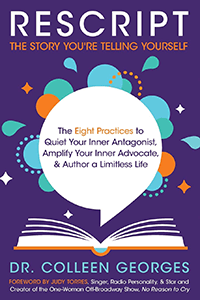
Taking the Leap: Starting Your Own Side Hustle or Business
On September 17, 2020, Mr. Simon, along with the Work Search Buddy Network, held a 90-minute live event, Taking the Leap: Starting Your Own Side Hustle or Business.
I had the honor of facilitating the event which featured Dr. Colleen Georges, Delphine Venitucci, and Stuart Weiner as our panelists.
This article is about the experiences and stories they shared during the webinar, focusing on what led them to start their own businesses and what advice, information, and insights they could provide to anyone starting or just thinking about starting their own business.
Quick Panelist Bios
Dr. Colleen Georges is a life and career coach, an award-winning author, and an organizational trainer. She has created a new program called the “Side Hustle Sisterhood” for women who are ready to start their side hustle.
Delphine Venitucci is a marketing and strategy leader with over 12 years of experience boosting performance of products, brands, and firms. She is embarking on her journey of starting her own business.
Stuart Weiner has over 25 years of experience as a compliance and privacy officer, primarily in the healthcare field. He is the principal of Integrated Compliance, a healthcare compliance consulting firm.
Getting Started: The Genesis of an Idea
Wondering how people get started on a path to their own business?
Let’s take a look at the way each of our panelists went from employee to entrepreneur.

Dr. Colleen Georges was a director of two programs at Rutgers University for low-income, first-generation students, providing tutoring services, career coaching, resume writing services, and personal and academic counseling.
She found she had a real passion for resume writing that went beyond helping her students. After helping both family and friends with their resumes as a “hobby,” she realized she could turn her passion into a business. She obtained the appropriate resume writing certification and started her own part-time resume writing and coaching business as a side hustle while still working at Rutgers.
After a couple of years, Colleen was motivated to move on from being a full-time employee while simultaneously doing her side hustle and being a new mom. She also wanted the flexibility to work from home to be there for her one-year-old son.
She realized it was time to make the leap to having her own business, working full-time with clients as a life, career, and resume coach, as well as an organizational trainer. Her expertise on these subjects led her to write extensively and become a sought-after speaker on these matters.

Delphine Venitucci was born and raised in France, then moved with her husband to Switzerland, and then to the United States two years ago when her husband relocated for work. Her background is in marketing and strategy, working in a broad range of industries, with a focus on small companies. Her experience provided a cross-functional vision of businesses – she had a high-level view and saw the co-dependencies between different areas.
Delphine had wanted to start an enterprise of her own for quite some time. Recently, she became interested in inclusivity for people with disabilities and in helping make a world where everyone has their own place.
She was inspired by Christina Mallon, a young disabled woman who is an activist in the disability world. Christina does not consider herself disabled. She is just disabled by design because the world is not made for her and has not been thought of with her in mind. Her view is that no one is really disabled if you build things differently or well.
This resonated deeply with Delphine, and she was motivated to do something in the area of designing for the disabled to help make this world more inclusive. Finding solutions became her passion, and she focused her attention on how to best accomplish this as a business.
Delphine is a startup advisor and has recently started her own business, specializing in accessories such as wheelchair wheel covers for disabled people.
With her background in marketing and strategy and the flexibility needed while homeschooling three children because of the pandemic, launching a business made sense, and truly embraces her life as a whole.

Stuart Weiner has been in the field of healthcare compliance for over 25 years and has developed a passion for all matters of individual privacy.
He is considered a subject matter expert, especially in Health Insurance Portability and Accountability Act (HIPAA) privacy and security. Holding various positions in healthcare compliance, including the role of chief compliance officer for a large medical center, he built his career around his passion.
After his last company downsized its compliance function, and while in transition, Stuart decided to create a business built around his knowledge and skills.
He decided to become a consultant to what he believed to be an underserved part of the medical profession. His company, Integrated Compliance, provides compliance and privacy services to small-to-medium-sized medical and dental practices.
These businesses have the same regulatory obligations as larger organizations but do not ordinarily have compliance personnel on staff to ensure they meet these requirements. Fines and corrective action plans from federal and state regulators can be expensive and onerous. With his guidance, Stuart helps practices reduce and avoid such costly penalties through effective compliance programs.
How Do You Differentiate Yourself?
One question raised during the webinar was, “How can you differentiate yourself from the competition?”
The following is a summary of what our panelists shared.
It’s Okay If Others Have the Same Business Idea
If you have an idea for a business, others likely have already thought of it or something similar. Don’t ever let that discourage you! It is actually a good thing because if others are doing it, that’s a sign it already works.
Try to make your idea unique within the same space. Offer something that is a little different (or a lot different if you can) to help your business stand out.
For instance, Integrated Compliance has lots of competition from large regional and national consulting firms in the same healthcare space. However, Stuart’s target customers are too small for many of those firms. So, although they may offer some of the same services, due to their size, they generally focus on much larger clients, leaving room for a business like Integrated Compliance.
Differentiate Yourself Based on How You Came to Launch Your Business
Experience – If this is something you have a lot of experience in, then make sure you highlight it. Let people know your background, how long you have done this, in what arenas you have done this, and what it entailed.
Training – Perhaps you came to this idea because you have a lot of training in this area; perhaps you have credentials and certifications. These are things that help you stand out, and you want to communicate them.
Passion – It could also be that it is something you are passionate about. Many entrepreneurs are motivated to start a business based on something built around their passion.
Your “WHY” means everything and is going to be what drives you when things get tough. So, ask yourself, “Why am I doing this?”
Get clear on your “WHY” and then share this in how you market yourself, how you talk about your business, how you talk about it on social media, and, most importantly, how you talk about it on your website where you share your background and your story.
Do not underestimate how important your story is and how important your passions are!
Colleen points out that we tend to underestimate how important our story is and how important our passions are. And we think that if we don’t have lots of experience or training credentials in this area, we can’t launch a business in this area, and that is absolutely not true.
"Find ways to open up about yourself and be as transparent as you are comfortable being in your marketing process, website, and social media," says Colleen.
Stand Out and Be Found via Your Website
Almost every business has a website, and if you are thinking of starting a business, it should be high up on your to-do list. It is your opportunity to market your product or service, tell your customers what your business is all about, share your philosophy, and provide a window into you!
Your potential customers need to find you, and what better place than on your website?!
Colleen notes, "It's so important to do the things that get you found!"
She strongly suggests reading up on Search Engine Optimization (SEO) to help ensure your website appears at the top of a Google search. This way, people will be able to find you and understand all the things you offer that could help them.
What Have I Done – Can I Really Do This?
Starting your own business is not easy. Once you have gotten over the initial enthusiasm of taking that first step or two, reality sets in.
At some point during their journey, each of our panelists asked themselves, “Can I really do this? After years of working for someone else, can I start something that will depend entirely on me, without the usual employer support network behind me?”
It can be scary and exhilarating at the same time...
Colleen shares that no matter how much experience someone has, no matter what their credentials are, at some point, they are bound to tell themselves, “I’m not ready, I don't know enough, I won't be able to help, people won't buy from me, this is not the time!” This imposter syndrome is one of the biggest things that stops people from starting their own businesses.
The imposter syndrome is when people doubt their own skills and accomplishments, and fear being exposed as a fraud. Do a reality check – is there evidence to support your feelings?
Rescript your negative self-talk by replacing it with positive statements about yourself and your abilities. Collect and revisit all the positive feedback you have received, learn to accept compliments, and if you still have concerns, talk about them with people you trust.
Don’t compare yourself unfavorably with others, recognize your successes and the progress you have made, and move forward!

Colleen’s book RESCRIPT the Story You're Telling Yourself offers strategies for rescripting your story and managing goal setting and perfectionism.
She explains, "When you launch, it's not going to be perfect. In fact, even 10 years later it's probably not perfect! You're going to be evolving all the time – you're going to learn by experimenting, by listening to your customers, by how much time people spend on different pages of your website."
Her book offers 130 exercises for rescripting self-talk, and one of them addresses perfectionism. It has you literally rewriting your script in a way that is specific to you.
Have you ever thought about how your perfectionism is impacting you, and having you live by rules you don’t even know are there?
By making yourself conscious of these rules, you realize you created them, and you can rescript them, too, so you can move forward to achieve your goals.
Delphine shared that her cultural background was an obstacle to her business launching project.
She clarifies, "In France, where I was born and raised, making mistakes is frowned upon. But making mistakes is something you have to cope with as an entrepreneur. Making mistakes and learning not to have everything perfect is something you just need to accept!"
In her article “Are you forward compatible?" published earlier this year, Delphine states that being forward compatible is about being curious and embracing novelty, uncertainty, and risk-taking.
She emphasizes that this open-mindedness is important because, as an entrepreneur, you need to explore things initially just to identify where you want to go. So, it's about observation and a willingness to understand people's expectations and needs.
You need to be in exploration mode all the time! You need to be willing to understand problems because, as an entrepreneur, you are here to solve a problem.
Delphine affirms, "You first need to identify a problem. And then you need to test ideas, concepts, your business model, a way of promoting your ideas, your business, etc. It’s all about conducting small field experiments where you try something, you observe, and then you learn the lesson. And you do this daily and build your path this way."
Stuart recalls that one of the most challenging things he faced was reaching his target audience. Doctors and dentists are busy professionals and are notoriously hard to reach. They are also well protected by their staff from non-patients trying to reach them. He tried many ways to contact them, including email, phone calls, direct mailers, and personal visits.
Here is how Stuart felt, "Initially, I became discouraged, wondering if I had made a mistake going into this business when I could not connect with the very people I was certain I could help..."
In the next section on Business Networking, we’ll look at how he overcame this problem.
Stuart also shared that people can use transferable skills to help them go from an employee mindset to an entrepreneur mindset. In his recent article on Mr. Simon, “Transferable Skills and Your Next Job,”, he explains, "Transferable skills are soft skills like communication, teamwork, organization, leadership, listening skills. All of these are very important, and most of us have a good many of those innately – we know how to do these things!"
Most transferable skills are those skills that you can take from job to job. Stuart advised that you take the same transferable skills you have used all your working life and move them into the business you're going to start. They will work for you as an entrepreneur, as well.
Business Networking
We all know that networking is vital to those seeking employment. In today’s job market, your best bet is having plenty of people on your side, helping you to land a job.
Well, it is just as important to the entrepreneur! If you are starting a business, there are many individuals, groups, and organizations that can help.
Although Stuart was initially discouraged, he remained persistent in his efforts and found other ways to reach potential clients. He worked with the Service Corps of Retired Executives (SCORE), joined the Monmouth Regional Chamber of Commerce, reached out to several professional medical and related societies, and spoke with a few physicians he personally knew to help him in ways he had not initially thought of, to aid in reaching his target audience. Eventually, he was able to land a few small contracts, and his business began to grow from there.
**Colleen **added that for her it was a group of professional resume writers and the Career Coaches Association. They had an email list that was very advantageous to her, especially in the beginning. Any time she had questions about something or a new thing came along, she found she could just ask people and receive lots of helpful responses. Professional associations, in particular those with an email list, are invaluable.
Key Takeaways
To summarize the information shared during the webinar, here are key insights from our speakers:
- Don't underestimate the importance of your story and your passions! Communicating your story will help people connect with your passion and connect with you.
- Sharing your “WHY” with others is one of the most important ways you can differentiate yourself. What’s the purpose of your business? Why did you create it? Inspire your target audience with your enthusiasm and passion so they believe in what you are doing for them.
- Identify your transferable skills and apply them to your business. Most transferable skills like communication, teamwork, critical thinking, organization, and listening are things you can take from job to job. Leverage these to help you go from an employee to an entrepreneur.
- Be in exploration mode all the time – this is really important! Be curious, identify a problem, conduct small field experiments to test your ideas, concepts, and business model. Learn from your experiments – was what you tried worth continuing or not? You build your path this way.
- Don't fall into the trap of perfectionism. Accept the fact that making mistakes and not having everything perfect is inevitable. When you launch your business, it is not perfect, and 10 years later it still won’t be perfect! You’re going to be evolving all the time.
- Networking is a lifetime commitment – it’s something you must always do! The individuals, groups, and organizations with whom you network can be the very ones who can help you drive success in your business.
- Don't let the imposter syndrome keep you from achieving your goals and aspirations. Replace your negative self-talk with positive statements about yourself. And, if there is no strong evidence to support your feelings of not being ready, move forward despite your fear. That is the only way to make progress and become an expert!
Conclusion & Resources
This article is meant to give our readers an overview of the live event on September 17, 2020.
Would you like to know all the details of our webinar? Then watch the full version of the recording on YouTube!
Successfully taking the leap to start your own business is a very personal decision, and we hope you have learned something about what it takes to make that leap.
For your convenience, we pulled together all of the helpful links and resources mentioned during our event:
- Full video recording of Taking the Leap: Starting Your Own Side Hustle or Business event
- Mr. Simon's Work Search Buddy Network
- Colleen's program “Side Hustle Sisterhood”
- Colleen's book RESCRIPT the Story You're Telling Yourself
- Delphine's article “Are you forward compatible?"
- Stuart's article “Transferable Skills and Your Next Job”
- An insightful TED-Ed Animation about the Imposter Syndrome
Books recommended by Delphine:
- Choosing the Right Legal Form of Business, by Pat Mitchell
- Law (in Plain English) for Small Business, by Leonard D. DuBoff and Amanda Bryan
About the Author: Marla Fishman has over 13 years of proposal and project management experience. She helps companies meet tight deadlines and ensure compliance with requirements by building strong relationships with cross-functional team members and collaborating with them to achieve quality, accuracy, and completeness. Marla has nonprofit and corporate experience and Lean Agile certifications. She serves as Assistant Director of the Professional Service Group of Central New Jersey (PSGCNJ) Training Committee. She is passionate about collaborating with others to achieve a common goal.
You don't have to be alone in your job search!
Mr. Simon invites you to join the Friends of Mr. Simon Meetup Group that supports both individuals seeking their next job role and working professionals. Members of our network come together to learn and practice new skills and network with others through our regular interactive events where they establish meaningful connections and have a chance to promote their personal brand and stand out in the marketplace.
Group membership is free of charge, courtesy of Mr. Simon.
Join our Friends of Mr. Simon Meetup Group to become part of our growing and supportive community!
